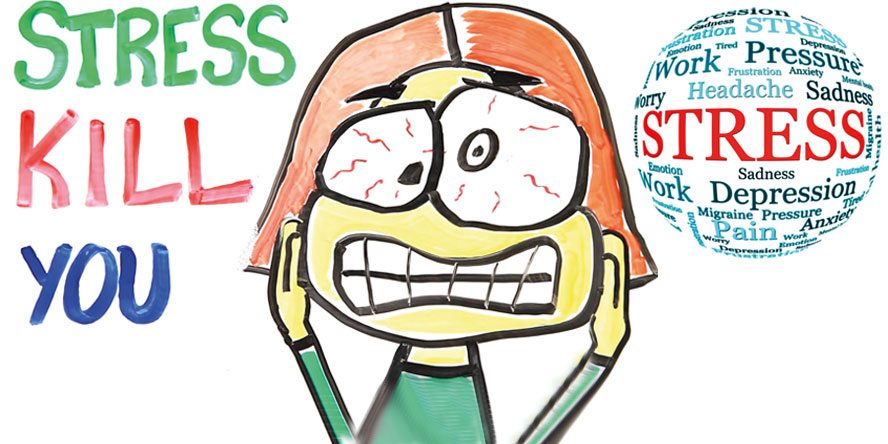Stress is one of the wearing issues that we need to cope up with most of the time in our lives. It is not an illness; however, it can be as detrimental as an illness or may pave way to many illnesses. However, it is not always bad and detrimental. The stress which does not become chronic and uncontrollable may help you be more aware of and better focus on things around you. In some situations, it may energize you or help you be more successful. However, if you lose the control of your life as a result of this stress, your job, home life, health or relationships may see great harm. That’s why stress is an issue which should not be ignored but managed.
Table of Contents
What is stress?
Stress is a nerve-shredding process which occurs as a result of a person not being physically and emotionally cope with a perceived threat, and usually affects their daily life negatively. When you feel that you are under threat, your nervous system secretes a stress hormone which alerts your body, and as a result, your blood pressure rises, your heart beats faster, your muscles contract and your senses sharpen.
That way, your physical strength and endurance are boosted, and you can focus on the problem and react faster. Therefore, you can avoid from dangers. This is a positive thing. However, if you are reacting like you are in a life-threatening situation to the daily problems such as traffic jam or bills, it means that you are suffering from an acute or chronic stress problem.
And this is a serious problem, and leads to negative emotions such as insecurity, anger and depression. As a result, you may experience very serious health problems.
Illnesses caused by stress
- Depression and anxiety disorder,
- Weight gain or unhealthy weight loss,
- Skin problems such as eczema,
- Various heart diseases,
- Digestive system problems,
- Sleep disorders,
- Memory problems and mental issues are illnesses caused by stress (Alzheimer’s disease, dementia)
- Autoimmune diseases (diseases which weaken the immune system)
- Reproductive problems
- Every kind of pain
- Heart diseases
Causes of stress
- Losing a loved one
- Divorce
- Losing a job
- Increase in financial responsibilities
- Marriage
- Moving to a new home
- Chronic disease or injury
- High pressure from family and friends
- Effort to meet the expectations of your spouse and children
- Experiencing racism
- School exams and job interviews
- Pregnancy and labor for women,
- A traumatic event such as a natural disaster, burglary, rape or violence
- Nursing for an old and ill family member
- Pessimistic mood
- Angry or depressed self-talk
- Expecting too much from oneself, perfectionism
- Being set in your ways, being unable to be flexible
- All-or-nothing thinking
What are the symptoms of stress?
- Physical symptoms: The physical symptoms include irregular sleep, headache, teeth grinding, jaw clenching, excessive sweating, muscle aches, constipation or diarrhea, fatigue, energy loss, high blood pressure and heart attack.
- Mental symptoms: Stress also manifests with mental symptoms as much as physical ones. Mental symptoms include difficulties in decision-making, poor concentration, forgetfulness, memory issues, increase in the possibility of making mistakes and decrease in work performance.
- Emotional symptoms: Changes in the body also affect the individuals emotionally. Therefore, a person’s emotional tendencies greatly differentiate in times of stress. The emotional effects include depression and easily crying, anxiety and worry, rapid mood changes, anger outbursts, aggression, hostility, distemper and irritability.
- Social symptoms: Stressed mood leads to negative effects on social life. These include distrust of people, not showing up for dates, trying to find mistakes of people and blaming others, excessively defensive behavior, offensive talking and being not speaking terms with others.
Stress types
Acute stress
It is the most common type and caused by current events and pressure such as exams, losing an important document, traffic accident or concert stress. While it can be exciting and support success when experienced in small doses, it can be consuming and damaging when it is too much. It is transient.
Episodic acute stress
Some people experience acute stress all the time. These people are always stressed and agitated. They cannot keep up with the deadlines, however, they shoulder a lot of responsibility and they put their feet to the fire, they experience a lot of misfortune. They tend to be angry, worried, impolite and rude. Therefore, their relationships with other people always worsen. They are inclined to develop heart diseases.
Chronic stress
It is the type of stress caused by permanent problems which cannot be solved or are hard to be solved such as family problems, poverty, ethnic problems or being unhappy at work. It is extremely wearing and makes the person miserable. It may also be caused by a childhood trauma, or experiences which cannot be blocked out or deeply affect the personality.
As a result, the person’s world-view is affected negatively and they think they are under a threat all the time. This causes a great amount of stress. Professional help might be necessary.
The most dangerous part of chronic stress is getting used to eat. As a result, the problem is ignored, and if left untreated, it may lead to serious problems such as suicide, heart attack, paralysis, or even cancer.
Treatment of stress
The treatment of stress is greatly based on the sources of it and the severity of your symptoms. The treatment may vary from simple relaxing sessions to hospitalization. After the cause of your stress is properly determined by a physician and the medical causes of your symptoms are eliminated, you can start treatment by using the following methods:
- A balanced and healthy diet,
- Reducing alcohol and caffeine consumption,
- Establishing a regular sleeping routine,
- Breathing techniques,
- Regular working out or doing short-term exercises,
- Determining the factors causing stress,
- Eliminating the sources of stress or adapting yourself to them,
- Sharing these issues with trustworthy people,
- Receiving psychological support,
- Taking meditation lessons,
- Taking up hobbies and making time for them,
- Being active in social activities.
Ways of dealing stress and management
Sometimes, it might be impossible to deal with it. Bills, busy work schedule, work and family responsibilities always continue. However, your life is actually under your control more than you think. In fact, the simple truth is that you can manage your stress to the extent that you control your life.
Management includes everything; your life-style, thoughts, emotions and coping skills. Not matter how stressful your life is, there are always steps you can take to take the heat of yourself and regain the control.
Tips for stress management
Tip 1: Determine the sources of stress in your life
- Take a closer look to your habits, attitude and excuses to determine the true sources of your stress: Stress management starts by determining the sources of it in your life. This is not as easy as it looks. While it is easy to determine the main sources such as changing works, moving or divorce, it might be more complicated to determine the sources of chronic stress. It is very easy to miss to see how your thoughts, emotions and behaviors contribute to your daily level of stress. Sure, you can be aware of your worries about your work life, however, the cause of your stress might not be the things expected from you, it might be your habit of procrastination. You cannot control your stress until you take the responsibility of your role in the development of or ongoing stress.
- Keep a stress diary: A stress diary may help to determine the stress you experience regularly in your life and the ways to deal with it. Record every time you feel stressed to your diary. If you write regularly every day, you start to see the patterns and common themes. Note:
What caused your stress? (If you are not sure, take a guess)
What did you feel physically and emotionally?
How did you react? What did you do to feel better?
Tip 2: Implement the 4 main commands for stress management
Prevent, Change, Adapt and Accept
While stress is an automatic response coming from your nervous system, some stress factors can be anticipated. These include commuting, meeting with your boss or family meetings. For these foreseeable stress factors, you can change the situation or your reaction to that situation. When deciding for an option in any scenario, it would be helpful to consider the 4 commands: prevent, change, adapt or accept.
PREVENT the unnecessary stress: It is not healthy to prevent a problem that should be addressed, however, there are many stress factors in your life which you can eliminate. First of all, learn to say “No”. Know your limits and do not take more responsibility than you can handle in your personal or work-life.
Avoid the people who are making you stressed, Control the things around you which makes you worried, Make your to-do list fair or completely remove it.
CHANGE the situation: If you cannot prevent a stressful situation, try to change it. You can do this by changing your communication methods and work style in your daily life.
- If something or somebody is disturbing you, express your feelings clearly and exactly
- Be disposed to compromise
- Create a balanced schedule which does not only consist of work, but also of social activities and pleasure.
ADAPT TO stress: If you cannot change the stress factors, change yourself. You can adapt to the stressful situations, and regain control of your life by changing your expectations and attitude.
- Consider the problems from a fresh point of view. For example, you can view a traffic jam as an opportunity to listen your favorite radio station or of some alone time.
- See the big picture, and ask yourself how important the stressful situation is in the long run
- Adjust your standards, quit being a perfectionist. “Good enough” is also OK.
- When stress makes you upset, take a moment to think about your positive qualities, skills and everything in your life that you appreciate.
ACCEPT the things you cannot change: Some sources of stress are unavoidable. You cannot prevent or change the stress factors such as losing a loved one, a serious illness or a national problem. In such situations, the best way to deal with the stress is accepting the situation as it is. Accepting might be difficult, however, in the long run, it is easier than to be afraid of something you cannot change.
- Instead of trying to control an uncontrollable problem, focus on your reaction to this problem
- Consider the challenges you encounter as a way of self-improvement
- Don’t hold on to anger and resentment, and learn to forgive
- Share your feeling by talking with a reliable friend or a therapist.
Stress test and treatment
Stress test provides information about how the heart functions under physical stress. An exercise is done to see how the heart functions during stress test. This exercise is usually walking on a treadmill or spinning. The test is performed during exercise. Physicians usually implement this test as it helps diagnosis coronary cardiac diseases (CCD).
The same test can also be used for coronary artery disease (CAD). CAD is a disease seen in arteries caused by a substance called plaque. These arteries serve to provide oxygen-rich blood to heart. The plaque in this disease narrows the arteries and reduces the blood flow going to heart muscles.
Plaque accumulation increases the risk of blood clot formation in arteries. And this may lead to chest pain and even to heart attack. When the heart is at resting, this disease may not be symptomatic. However, when exercising, CCD and CAD may be diagnosed.
Problems which can be diagnosed during stress test
– Abnormal changes in heart beat or blood pressure,
– Symptoms of breathing difficulty or chest pain during mild breathing exercises,
– Abnormal changes in heart rhythm may be observed.
Types of stress test
- Standard exercise stress test: Standard exercise test uses ECG (electrocardiography) to see and record the electrical activity of heart. ECG shows the heartbeat and rhythm. It also records the timing and amplitude of the electrical signals going through the heart. The blood pressure is controlled during the test. Exhaling into a special tube might be requested during the test, and this is because the physician wants to see the breathing force.
- Imaging stress test: As a part of some stress tests, the images of the heart are taken during exercise. This imaging shows the level of functioning of the heart and the level of blood it pumps. A type of imaging stress test contains echocardiography (echo). This test uses sound waves to create a moving image of the heart. The test reveals the regularity and functioning of the heart under stress.
How to prepare for stress test
- It is undesirable to eat or drink for two hours before the exercise stress test.
- Unless otherwise recommended by the physician, the currently used medications can be taken as other days.
- If you are using medication for asthma or respiratory disease, bring them with you before the test.
- The physician should be clearly informed about all used medications.
- Comfortable clothes and shoes should be preferred for the stress test.




